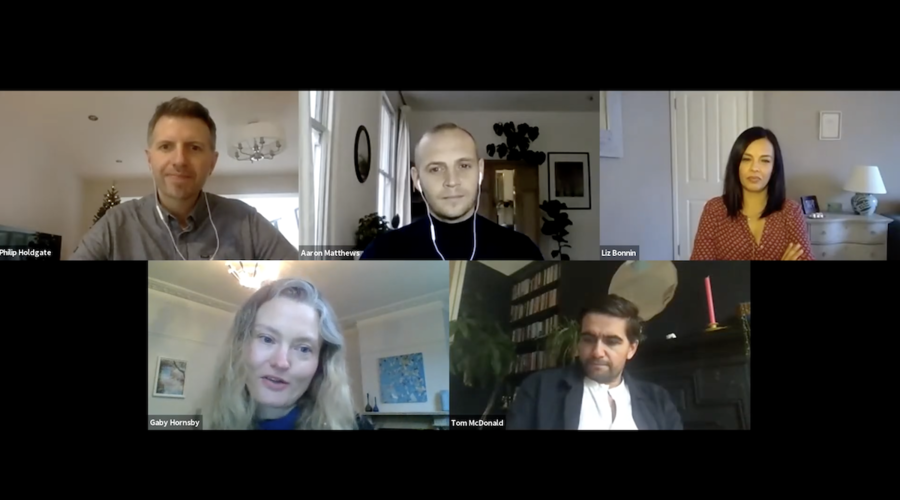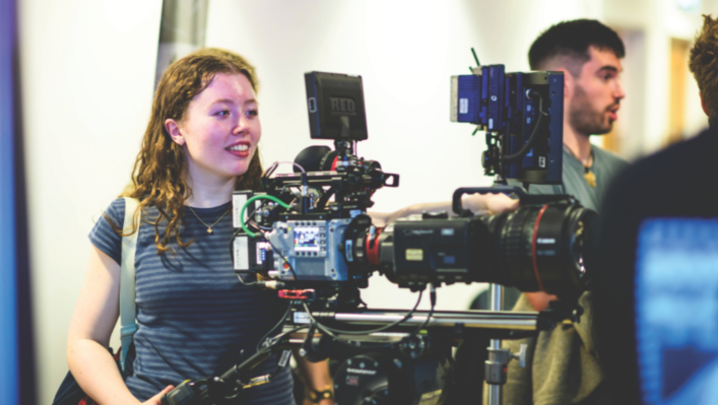A stellar panel tells RTS Futures that television companies have a vital role in combating the climate crisis
Television soap operas have an important role to play in communicating environmental messages. That was one of the conclusions of an RTS Futures session, “Can TV save the planet?”, which discussed how it is not only the likes of David Attenborough and Chris Packham who can alert audiences to the impact of climate change and other environmental challenges.
Tom McDonald, director of BBC Studios Factual, whose commissions have included Blue Planet II and Drowning in Plastic, said that, as shows such as Coronation Street and EastEnders had influenced attitudes to sexuality, they could similarly heighten awareness of ways to live more sustainably.
“Soaps take things that might be considered minority interest and put them into the heart of the mainstream,” he said. “My mum and my granny are more likely to be affected by something they see in EastEnders than in a David Attenborough film.”
He noted that the café in EastEnders no longer served bacon sandwiches. He also suggested that Top Gear had an opportunity to feature more electric cars – not only as worthy modes of transport but in an exciting and fun way.
“On the other hand, I don’t want to watch Bake Off and be told what the cake’s ingredients are and what they’re doing for the environment,” added McDonald. He hoped that environmental messages would become so common in TV programmes that they no longer stood out.
Philip Holdgate, senior project manager at ITV Studios, said that soaps not only reached a different audience to natural history and current affairs programmes, but that they were also watched by up to seven million viewers five nights a week.
Emmerdale had been at the forefront of embedding environmental themes by banning plastic straws from the Woolpack bar and featuring a corner shop selling locally grown, organic produce delivered by an electric van.
“You don’t have to ram it down people’s throats. It can be quite subtle,” he said. “Audiences can be shown that you can do things differently and it’s not that scary. Soaps are at the forefront of that. They’re a window into someone else’s life. If you show this life being lived in a way that doesn’t damage the planet, it’s a powerful tool.”
Broadcaster Liz Bonnin, a presenter of Blue Planet Live, agreed that soaps were important to TV, effecting real change in people’s behaviour, but urged broadcasters and platforms to continue to commission hard-hitting films that didn’t “sugar the pill”. She lauded the recent Extinction: The Facts, presented by Attenborough.
“We shouldn’t be apologetic about communicating the cold, hard facts,” she insisted, adding: “The pandemic is connected to how we extract natural resources and degrade forests. Viruses have more of a chance to emerge and affect us when there is environmental degradation.”
Frozen Planet II, to be broadcast next year by the BBC, would contain material that even experienced natural history film-makers were likely to find alarming, said McDonald. “The evidence is frightening. I predict it will have a massive impact,” he said.
He agreed that natural history films had changed from the days when TV drew “people in through awe and wonder, incredible storytelling and then you hit them with the strong environmental message”.
But should broadcasters be campaigners, asked Gaby Hornsby, BBC assistant commissioner for seasons and campaigns, factual, and TV sustainability lead, who chaired the discussion.
This was something of a minefield, noted McDonald: “It gets complicated because, unfortunately, the solutions are political with a small P. People dispute what are the right ways to behave.”
Both Hugh Fearnley-Whittingstall and Jamie Oliver had made programmes infused with “a campaigning spirit”, but the BBC executive stressed that it was “not our job to say, ‘You must do this’. But it is our job to show change-makers. They inspire people to bring that change into their own lives.”
He continued: “The interesting bit is when you engage heart and head, and galvanise people to act in a way that feels like they’re not being told off.” In other words, getting the tone right and avoiding being didactic.
In the Netherlands, a TV drama, shown by a public service broadcaster, brought about policy changes after it highlighted the dangers of rising sea levels. A telenovela shown in Brazil illustrated the deleterious effects of deforestation on a local family.
McDonald quoted a recent survey which had shown that, despite the pandemic, for young people, climate change remained the single most important issue facing society. “I was worried that climate change was falling down the agenda but that doesn’t seem to have happened,” he said. The climate crisis was of such urgency that it was vital to commission and broadcast films that said: “Wake up and listen.”
One problem was that, in common with other media, TV was guilty of promoting mixed messages. Cookery shows tended to feature a lot of beef eating while, in other shows, viewers were encouraged to eat more plant-based diets. The panel noted, however, that people would need to cut their meat consumption by only 20% to help reduce carbon emissions by significant levels. The way flying was portrayed across TV sent out a mixed message on flying’s environmental harm.
Celebrities needed to play their part, too, everyone agreed. It was all very well having Attenborough and Packham bang the drum on environmental messages, but Bonnin suggested that entertainment stars such as Ant and Dec occupied a potentially powerful position to promote action on sustainability.
As for encouraging production teams to work in a more environmentally conscious way, Aaron Matthews, head of industry sustainability at Bafta, said that big strides were being made. The Albert certification scheme had been in place for around five years. He described it as a practical checklist.
Fulfilling Albert criteria involves such things as ensuring that productions use electric generators, limit their travel by hiring crews locally and offsetting carbon when carbon footprints can’t be reduced. “On scripted shows, people are now using zero-carbon generators,” Matthews explained. “It’s also important to ensure that supply chains are sustainable.”
Studios are encouraged to use renewable energy suppliers. “These are things that, over time, create change,” he said. A recent Albert report, “A screen new deal – a route map to sustainable film production”, aims to inspire scripted producers to move towards zero-carbon filming.
Holdgate said that, at ITV, there had been a view that working in a more sustainable way would be more expensive. However, this attitude had begun to change. “We’re asking people to be more efficient and to avoid waste,” he said. “When you’re not wasting electricity or costumes, you’re potentially saving money. People should think less about cost and more about value.”
ITV is discussing using low-energy lighting on sets for Coronation Street and Emmerdale, daytime and news. This could save 90% of current energy use, a massive impact, suggested Holdgate. “It’s not a quick or cheap thing to do but it’s on our road map.”
He added: “On using low-energy tariffs, we’ve made huge progress in a relatively short period. I’m interested to see if that leads to progress with on-site renewables and storage.”
Despite the evidence that the planet was heating at an alarming rate, all the panellists were optimistic that real and lasting change was possible. For all our sakes, let’s hope that they are right.
Report by Steve Clarke. ‘Can TV save the planet?’ was an RTS Futures event held on 3 December. The producers were Gaby Hornsby and Ali Laurie.





